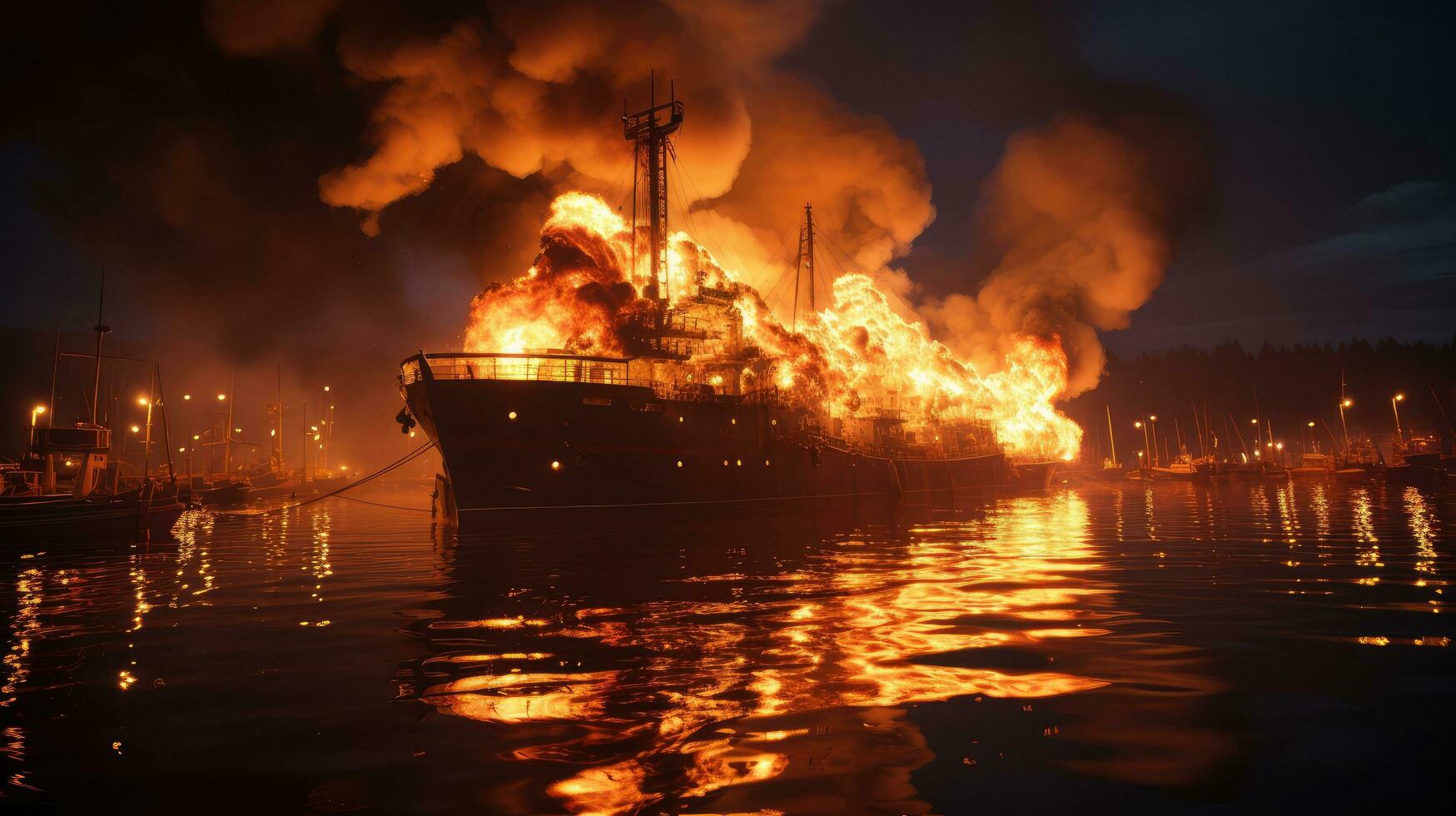By Vaishali Basu Sharma
In the spate of attacks in the Red Sea, a Liberian-flagged ship caught fire early December 15 after allegedly being hit by a Houthi rebel-launched projectile. The projectile hit the left side of the container ship Al Jasrah, causing a container to fall overboard and a fire on the deck.
EXCLUSIVE: Indian Navy ‘Surpasses’ Air Force, Army In Space-Based Comm; Leads In ‘Make In India’ Initiative – Naval Chief
The previous day, Houthi rebels claimed responsibility for a failed missile attack on a Hong Kong-flagged ship, the Maersk Gibraltar, sailing from Salalah, Oman, to Jeddah, Saudi Arabia.
Before firing missiles at it, the Houthis attempted to board and reroute Maersk Gibraltar. The rocket was fired from Houthi rebel territory in Yemen as the container ship was passing through the crucial Bab el-Mandeb Strait, which translates to ‘Gate of Grief,’ and is the southern gate of the Red Sea.
Barely 29 kilometers wide at its narrowest point, the Bab el-Mandeb Strait is between Arabia (northeast) and Africa (southwest) and connects the Red Sea (northwest) with the Gulf of Aden and the Indian Ocean (southeast).
In a statement to ‘Saba,’ the Yemen state-run news agency, a spokesman for the Houthi military claimed that the missile had indeed hit Maersk Gibraltar. However, other news organizations, including The Washington Post, reported that a defense official said the missile missed the commercial ship.
The following day, the US Central Command confirmed that a ballistic missile was fired into the international shipping lane. “Midday Dec. 14 (Sanaa time), a ballistic missile was fired from a Houthi-controlled area of Yemen toward the international shipping lane north of the Bab-el-Mandeb. There were no injuries or damage…..Following the missile launch, the M/V Maersk Gibraltar was hailed by the Houthis, who threatened further missile attacks. The M/V Maersk Gibraltar is a Hong Kong-flagged cargo container vessel.”
Close on the heels of the attack on Gibraltar, USS Mason (DDG-87) intercepted and shot down a drone attack on Motor Vessel Ardmore Encounter. The Liberian-flagged MSC Palatium III was also attacked on December 15 with a drone in the Bab al-Mandab Strait.
Houthi rebels have initiated a multitude of seaborne attacks as part of their pressure campaign over the Israel-Hamas war raging in the Gaza Strip. The Iran-backed Houthi rebel movement (Ansar Allah) aims to govern all of Yemen and support external movements against the United States, Israel, and Saudi Arabia.
Aligning themselves with Hamas, the Houthi rebels have launched attacks targeting Israel, using missiles and Unmanned aerial vehicles (UAVs), some of which were subsequently intercepted by the Israeli Defense Forces (IDF) over the Red Sea using the Arrow missile defense system.
The Houthis rebels have said they will attack any ships that are connected to Israel or travel to or from the country. Last month, the Houthis seized a vehicle transport ship linked to Israel in the Red Sea off Yemen and still hold the vessel near the port city of Hodeida.
To protect its cargo and crews from further such attacks, shipping giant Maersk has announced that it will stop transporting goods through the Suez Canal following attacks by the Houthis.
Other companies have followed suit; Swiss-based MSC Mediterranean Shipping Co, the world’s largest container shipping company, announced that it would stop using the Suez Canal after an attack on one of its ships.
German company Hapag-Lloyd also declared the suspension of its ships’ passage in the Red Sea. Leading commodities traders, Trafigura said it was “taking additional precautions” for its owned and chartered vessels.
The decision to stop ship traffic in the Red Sea will necessarily mean circumnavigating Africa, leading to an extension of shipping times by approximately two weeks to a month, depending on the destination region, vessel speed, and ship category. This roughly translates to an additional US$400,0000 to US$1 million per ship.

An estimated $1 trillion in goods pass through the strait annually. This will have severe ramifications for Israel because about 99% of goods (in terms of cargo volume) reach Israel by sea, and around 40% of the cargo arriving in Israel passes through the Suez Canal.
Linking the Red and Mediterranean Seas, the Suez Canal is one of the world’s busiest petroleum shipping channels. Its continued prominence as one of the world’s most essential chokepoints raises its attractiveness to security challenges, such as terrorist attacks on the canal.
The threat of terrorist attacks and the war in Gaza has raised obvious concerns about the stability of shipments through the Suez Canal. Meanwhile, Egypt’s Suez Canal Authority chief said on December 17 that the authority is closely monitoring the current tensions in the Red Sea.
The Pentagon has said that a US warship also came under attack off the Yemeni coast. There are indications that the US is also considering a maritime coalition force in partnership with 39 nations in the Red Sea to protect ships.
This will likely differ from the already established Task Force 53, but the Pentagon has not provided details about what the combined maritime task force would do.
- Vaishali Basu Sharma is an analyst of strategic and economic affairs. She has worked as a consultant with India’s National Security Council Secretariat (NSCS) for nearly a decade. She is presently associated with the New Delhi-based think tank Policy Perspectives Foundation.
- The author can be reached at postvaishali (at) gmail (dot) com.